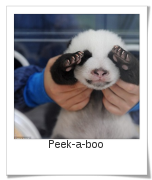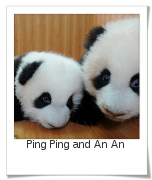The following news story I found on the daily mail web site mentions that the first set of twins born this year have turned 100 days old and are having a naming ceremony but fails to mention their names. Does anyone know?
As these adorable twin giant panda cubs playfully roll around on the floor, they seem worlds away from the devastating earthquake that destroyed much of their habitat in south west China.
They are one of the first twins delivered this year at the Bifengcia base of the China Giant Panda Protection and Research Center in Yaan, in the Sichuan Province.
The cubs are said to be in good health just five months after an earthquake left an important panda habitat, the Wolong Nature Reserve, largely destroyed.
But there was cause for celebration for the endangered species as the centre prepared a naming ceremony for the twin cubs 100 days days after their birth - in keeping with traditional Chinese custom.
Thirteen giant panda have been born this year at the centre.
Scientists at the research base hope to increase the captive population of giant pandas and ultimately reintroduce the distinctive black and white animals to the wild, with the help of artificial breeding.
Breeding success: The twins are among the thirteen giant pandas that have been born this year at the research base
Before the earthquake - which hit on May 12 killing 70,000 people - there were 63 pandas kept at Wolong.
After the quake hit, 53 of them were transferred to breeding bases in other areas. The rest were kept in safe places at Wolong.
Among the panda casualties were one killed, one missing and another became sick and died.
There are only around 1,590 pandas living in China, mostly in the Sichuan area and the northwestern provinces of Shaanxi and Gansu.
Last year, the number of captive bred giant pandas was 239.
Giant pandas are known for being sexually inactive. Their numbers have been dwindling because of of their shrinking habitat.





